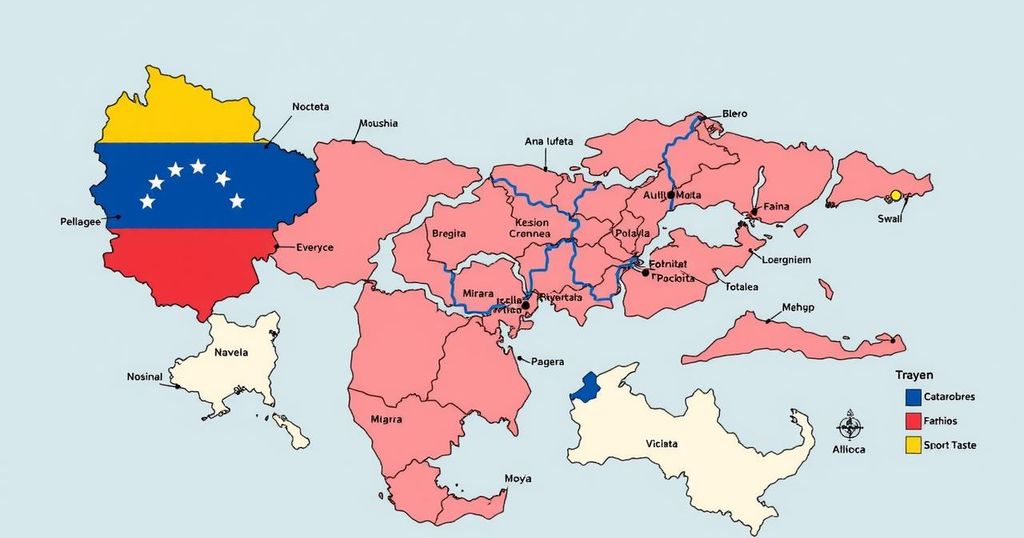In the controversial 2024 Venezuelan presidential elections, both Nicolás Maduro and opposition candidate Edmundo González Urrutia claimed victory, with the CNE supporting Maduro’s win amid allegations of electoral fraud. International responses have criticized the legitimacy of the election, leading to heightened tension both domestically and abroad. The situation culminates in the upcoming inauguration scheduled for January 10, 2025, with ongoing calls for electoral transparency.
On July 28, 2024, the Venezuelan presidential election resulted in both Nicolás Maduro and opposition candidate Edmundo González Urrutia claiming victory. The National Electoral Council (CNE) supported Maduro’s assertion that he won with 51 percent of the vote, while González Urrutia received 44 percent. However, this announcement has drawn allegations of electoral fraud from the opposition and international observers, who emphasize the CNE’s lack of clear evidence to support its claims.
Political Science Professor MJ Peterson remarked, “What happened in July and is happening now is the continuation of a long saga of Maduro working to stay in power.” Earlier in the year, opposition leader María Corina Machado was barred from running due to her support for U.S. sanctions, leaving her political surrogate, González Urrutia, as the primary opposition figure. The CNE has not released detailed voting records, prompting the Democratic Unitary Platform (PUD) to dispute the official results, claiming they reflect a landslide victory for González Urrutia by a margin of approximately 30 percent based on their own compiled data.
U.S. Secretary of State Antony J. Blinken publicly condemned the process, describing the CNE’s swift proclamation of Maduro’s victory as lacking credibility due to numerous irregularities. Following this, the U.S. formally recognized González Urrutia as the legitimate president-elect. Meanwhile, nations such as Russia and China have congratulated Maduro despite the concerns raised.
Tensions escalated when Maduro’s government issued an arrest warrant for González Urrutia, leading him to seek asylum in Spain. He claimed he was forced to acknowledge Maduro’s victory under duress, stating, “In those moments, I felt I would be more useful free, rather than incarcerated.”
As of October 16, 2024, Maduro announced preparations for his inauguration despite widespread international skepticism and opposition. Political analysts, including Professor Peterson, note that for Maduro to retain legitimacy, the military’s alignment is crucial, as shifting loyalties could threaten his authority. Amid calls from various countries and organizations for the release of electoral records, the U.N. has launched an investigation into the election outcome, urging the Venezuelan government to preserve all documentation.
Looking ahead, the next presidential inauguration is scheduled for January 10, 2025, amid ongoing tensions within the country and international condemnation of the electoral process.
The 2024 Venezuelan elections drew significant global attention due to the longstanding political unrest in the country under Nicolás Maduro’s rule. Challenges to his government have increased, particularly following the disqualification of prominent opposition figures like María Corina Machado. With allegations of fraud permeating the electoral process, voices from both domestic and international political spheres have called for transparency and integrity in the voting systems. The geopolitical ramifications and battles for leadership in Venezuela continue to unfold against a backdrop of severe economic challenges and humanitarian crises.
The 2024 Venezuelan elections underscored deep divisions within the country, with significant implications for its governance and international relations. While Nicolás Maduro has proclaimed victory, opposition claims and international scrutiny cast a shadow over the legitimacy of these results. The political landscape in Venezuela remains volatile, with rising tensions between government and opposition forces, as well as among foreign nations, signaling uncertainty for the future administration following the upcoming inauguration.
Original Source: dailycollegian.com







